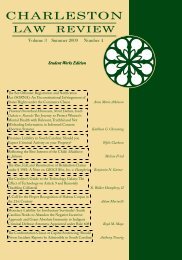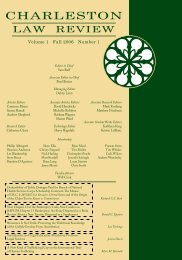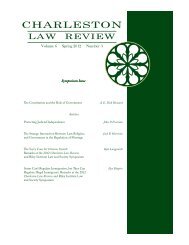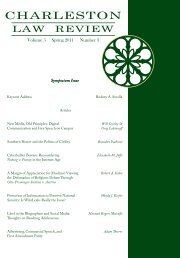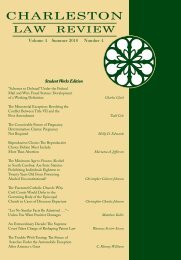Volume 5 Winter 2011 Number 2 - Charleston Law Review
Volume 5 Winter 2011 Number 2 - Charleston Law Review
Volume 5 Winter 2011 Number 2 - Charleston Law Review
Create successful ePaper yourself
Turn your PDF publications into a flip-book with our unique Google optimized e-Paper software.
<strong>2011</strong>] Errors in Judgmentthere are serious penalties for any such efforts, includingcriminal penalties. 2financial affairs;(5) the debtor has failed to explain satisfactorily, beforedetermination of denial of discharge under this paragraph, any loss ofassets or deficiency of assets to meet the debtor’s liabilities;(6) the debtor has refused, in the case—(A) to obey any lawful order of the court, other than an order torespond to a material question or to testify;(B) on the ground of privilege against self-incrimination, torespond to a material question approved by the court or to testify,after the debtor has been granted immunity with respect to thematter concerning which such privilege was invoked; or(C) on a ground other than the properly invoked privilege againstself- incrimination, to respond to a material question approved by thecourt or to testify.Id.2. 18 U.S.C. § 152 (2006) (“Concealment of assets; false oaths and claims;bribery”):A person who—(1) knowingly and fraudulently conceals from a custodian,trustee, marshal, or other officer of the court charged with the controlor custody of property, or, in connection with a case under title 11,from creditors or the United States Trustee, any property belonging tothe estate of a debtor;(2) knowingly and fraudulently makes a false oath or account inor in relation to any case under title 11;(3) knowingly and fraudulently makes a false declaration,certificate, verification, or statement under penalty of perjury aspermitted under section 1746 of title 28, in or in relation to any caseunder title 11;(4) knowingly and fraudulently presents any false claim for proofagainst the estate of a debtor, or uses any such claim in any caseunder title 11, in a personal capacity or as or through an agent, proxy,or attorney;(5) knowingly and fraudulently receives any material amount ofproperty from a debtor after the filing of a case under title 11, withintent to defeat the provisions of title 11;(6) knowingly and fraudulently gives, offers, receives, or attemptsto obtain any money or property, remuneration, compensation,reward, advantage, or promise thereof for acting or forbearing to actin any case under title 11;(7) in a personal capacity or as an agent or officer of any personor corporation, in contemplation of a case under title 11 by or againstthe person or any other person or corporation, or with intent to defeatthe provisions of title 11, knowingly and fraudulently transfers orconceals any of his property or the property of such other person or195



